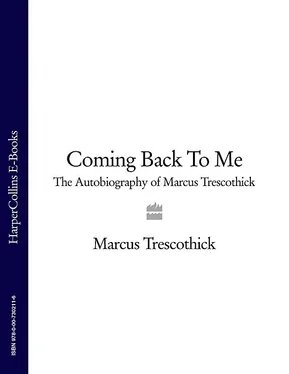By the time we checked in for the flight at around 7.30 p.m., I was clinging on and clinging to the idea I might just be able to get on the plane and once aboard, maybe the feelings would go. Take-off time was about 90 minutes away. I had the length of a football match to try and hold myself together. We went through to the departure lounge and I made my way with Steffan and Jason to the nearest coffee bar. I ordered a bacon and egg sandwich and as I finished the last bite, time stopped for a millisecond. In that blink of the mind I was cooked and I knew it. Sensing I could go at any second, I was desperate to get up from the table and get away from the other two lads because I never liked breaking down in front of other people. I managed to make it as far as Dixon’s. ‘Oh, God.’
I rang Sarge, and asked him to come and meet me straight away, though I didn’t tell him why. He said later that he thought I wanted some clarification over what speakers I should get for my iPod or some such. When he finally arrived he could see the state I was in. This isn’t intended to earn me a badge, but this is a guy who had seen active service and he was clearly taken aback by what he saw. Later, he told me: ‘To see a grown man in this state was quite tough.’
At first he tried to talk me round. ‘Marcus,’ he said. ‘You’ve got to fight it. You’ve got to get yourself over this wall.’
I understood what he was saying. And I would have loved to have been able to say ‘Sarge, you’re right. That’s what I’ve got to do and I’m going to do it.’
The fact was I couldn’t. In between the sobs and tears, I told him: ‘Andy, I’d love to be able to but I’m not sure I can. I don’t want to get over to Dubai and f**k it up and have to come home again. That is the last thing I want to do. I’d rather walk away from it now than go over there, then have to get a flight home again, because I’ve done that twice before and it causes me so much pain.’
Andy and I walked out of Dixon’s and found a little corridor which was a bit more private. Jason had joined us but by now Andy had realized that his original approach was doomed. Now they were just listening, sympathetically but clearly conscious of the significance of the moment.
I told them: ‘I just can’t keep putting myself through this. It’s too painful. I can’t keep doing it. I don’t want to do it to myself any more. I don’t want to do it to Hayley. That’s enough.’ Someone said: ‘Okay. We’ll get your bags off. You’re going home’, and I said, ‘Yeah, sorry. That’s it.’
It’s hard to say how long it took for the symptoms of my illness to subside long enough to allow me some clear air to think about something, anything, other than how awful I was feeling. But when that moment came, so did certain truths and the most hurtful one was this: I could never again contemplate the possibility of playing cricket for my country, the love of my professional life.
I knew, finally and without a shadow of doubt, that my days as an international cricketer were over. I’d run out of road.
Transport was arranged for the trip home. It was a long journey. Whereas, after my two previous breakdowns, the overwhelming reaction to coming home had been relief, this was different. The implications of my inability to go on a gentle pre-season trip with my county were obvious and they hurt because I had so loved playing for my country. Not only did I feel dejected, but also, and, for the first time, I felt guilty because I had let down not only myself but everyone else who had tried so hard to help me get better; people at the club, my family and my counsellor, who had given so much to try and make it happen for me. I had assured them I was going to be all right and I truly believed I would be. Now I knew there was no going back.
I rang Hayley and told her what had happened and that I was coming home. I rang my parents and I rang Brian Rose, the club’s Director of Cricket, who, along with everyone at Somerset had been so incredibly supportive of me throughout my troubles. And we agreed to issue a statement the next day. Then someone at the club realized the news had to be put out immediately because Sky TV were due to meet the plane in Dubai. Imagine what kind of story would have emerged if the TV pictures had shown all the Somerset boys arriving, except me.
So Richard Gould, the club’s Chief Executive, put out the following holding statement at 10.22 p.m. that night:
‘ Marcus Trescothick has withdrawn from Somerset’s pre-season tour to the United Arab Emirates .
‘ The decision was taken last night (14 March) shortly before the other players boarded a plane for the 12-day trip .
‘ Marcus’s absence is due to a recurrence of the stress illness which caused him to quit two England tours .’
As soon as I got home, I went straight to bed. The emotional strain of the day had left me shattered. And I didn’t feel a great deal better when I woke up the next morning because I knew what was facing me. In the meantime, another statement was issued by the club at 9.54 that morning, saying:
‘ Brian Rose has assured Somerset supporters that Marcus Trescothick will be fit to play a full part in the coming county season. Brian said: “I spoke to Marcus last night and, while it is unfortunate that he has suffered a recurrence of his stress problems, I am certain he will be available to start the season for Somerset .
“ I don’t see the setback as a major problem. Marcus did a tremendous job for us last season and will be a key player again this summer .
“ His cricketing life is with Somerset and I am sure he will continue to enjoy playing for the club as he has done for many years ”.’
It was about now that my counsellor switched on his television at home, called up Teletext and learned for the first time that I hadn’t boarded the flight. He told me later that the news had come as a complete surprise, so sure had he been from our meetings and phone calls that I would be able to make the trip.
I knew the first thing I had to do was get to the ground as soon as possible. I said to myself: ‘I’m going to go out and face people now. There’s no point p***ing about with it. I’ve got to face them at some point, let’s just do it today.’ And I walked into the club shop and bumped into an ex-colleague of mine, Mike Burns, and something lifted. I had a laugh and a joke with him, then I realized I still had my plane ticket in my pocket. ‘Burnsy,’ I said. ‘I’ve got a ticket here to go to Dubai. If you fancy a trip … the lads find themselves unexpectedly a man short.’
As far as the England situation was concerned there was only one thing left to do. Already, and not unnaturally, some of the Sunday papers, whose cricket correspondents were down in New Zealand covering the England Test tour, had speculated that my international career was now almost certainly over. I knew we had to put something out as soon as possible confirming my intention to retire immediately, but, and even though it was a slim possibility it would, I didn’t want the news to cause a distraction for anyone in the camp 11,000 miles away. Even on the day I had failed to get on the plane to Dubai, Paul Collingwood had been asked at a press conference, at the end of day one of the second Test in Wellington, for his reaction to my news; the guys certainly didn’t need to have to answer any more questions about me when they had other things on their mind, like trying to come back from 1–0 down against the Kiwis.
I met with Richard Gould and Brian Rose. We discussed the pros and cons with the club chairman Andy Nash and we all agreed the best thing would be to prepare a statement for release after the end of the third and final Test match in Napier, with a press conference at Taunton on Thursday 27 March.
Читать дальше












